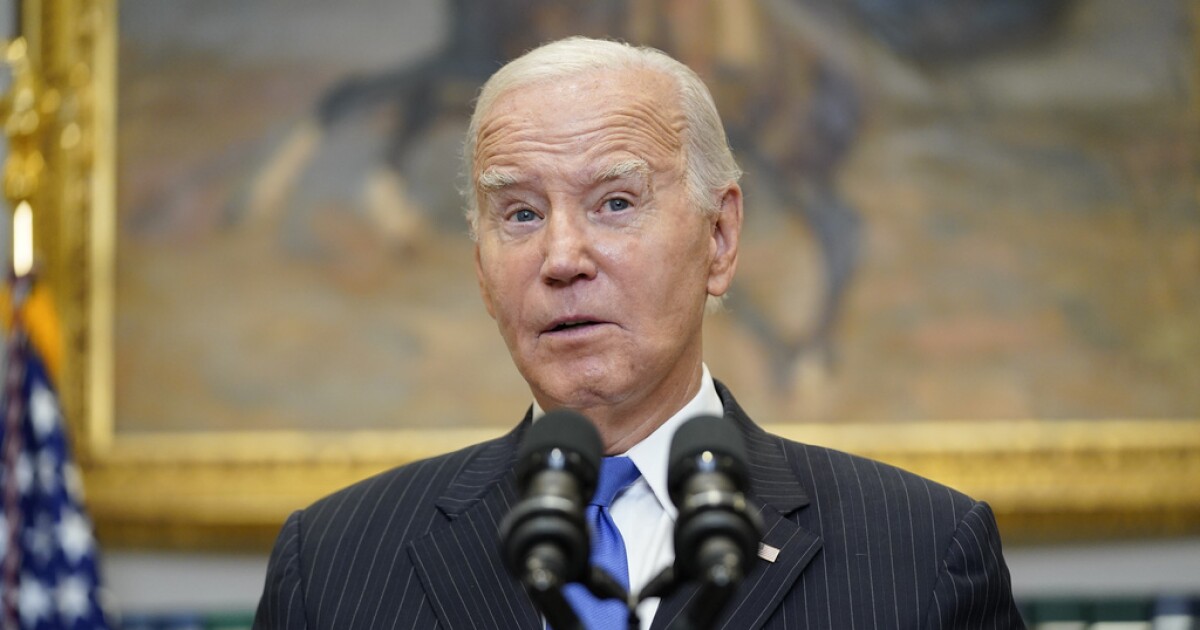

The White House is trying to knock down any suggestion that $6 billion in Iranian assets it unfroze as part of a prisoner swap last month has anything to do with the terror attack Hamas carried out on Israel.
Several Republican presidential candidates and other officials pinned part of the blame for Saturday’s violence on President Joe Biden and his administration’s overtures to Iran, the top sponsor of terrorism in the world. Former President Donald Trump, in particular, argued that “American taxpayer dollars helped fund these attacks.”
EYES TURN TO IRAN AS ISRAEL RESPONDS TO HAMAS TERROR ATTACKS
The Biden administration was quick to counter the criticisms, claiming the attacks are tantamount to “disinformation.”
“I can’t comment on 2024 because of the Hatch Act. But I can clarify the facts: Not a single cent from these funds has been spent, and when it is spent, it can only be spent on things like food and medicine for the Iranian people,” National Security Council spokeswoman Adrienne Watson posted on X, formerly known as Twitter. “These funds have absolutely nothing to do with the horrific attacks today and this is not the time to spread disinformation.”
I can’t comment on 2024 because of the Hatch Act. But I can clarify the facts: Not a single cent from these funds has been spent, and when it is spent, it can only be spent on things like food and medicine for the Iranian people.
— Adrienne Watson (@NSC_Spox) October 7, 2023
Attempting to split hairs on whether any of the $6 billion has been spent “artificially and very narrowly” shrinks the problem, Foundation for Defense of Democracies Senior Fellow Behnam Ben Taleblu told the Washington Examiner.
“I think it’s really missing the forest for the trees, the decision to have a legalistic debate about ‘before the first rocket was fired in this most recent iteration of the conflict,'” Taleblu said. “Did any money get transferred genuinely misses the forest for the trees about what the Islamic Republic can and has done in the past with abusing humanitarian accounts.”
Taleblu said quibbling about whether it was the most recent tranche of unfrozen funds or other aid Iran has received also ignores the Islamic Republic’s history as a financier of terror and its officials saying out loud that they can and will spend money how they please.
It’s unclear how long the conflict that erupted on Saturday will continue, but Taleblu said it offers a good “test case” for the Biden administration.
In Biden’s attempts to resurrect the Joint Comprehensive Plan of Action, and repair the U.S. relationship with Iran, Taleblu said the administration has continued to respond to the Islamic Republic’s bad behavior with “permissiveness.”
Now, that bad behavior could scuttle another deal Biden was hoping to cut, one that would have expanded on Trump’s historic Abraham Accords and help normalize relations between Saudi Arabia and Israel.
However, that deal might have fallen apart on Saturday. In the wake of the violence, Saudi Arabia made it clear it laid the blame for the conflict not on Hamas but on Israel.
“The kingdom calls for an immediate halt to the escalation between the two sides, the protection of civilians, and restraint,” the Saudi Foreign Ministry said Saturday. “The Kingdom recalls its repeated warnings of the dangers of the explosion of the situations as a result of the continued occupations, the deprivation of the Palestinian people of their legitimate rights, and the repeating of systematic provocation against its sanctities.”
Biden’s new “test case” gives his administration to “call a spade a spade and connect the dots between Tehran and their proxies,” Taleblu said. “Connect the dots between how it has abused humanitarian accounts in the past.”
CLICK HERE TO READ MORE FROM THE WASHINGTON EXAMINER
Getting tough on Iran, for instance, by implementing strict oversight and monitoring for the $6 billion in assets that have been unfrozen but the administration says is unspent, will be a requirement if Biden wants to continue to be tough on Russia.
“Given where things are, I think it’ll be hard to look away,” Taleblu said. “And I don’t know how this administration can look away and continue to disconnect the dots, but here we are.”






